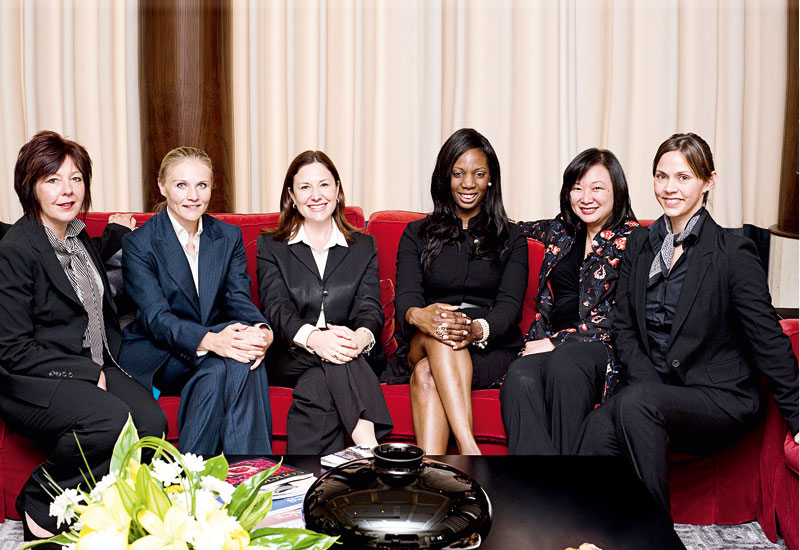 From left: Sarah Walker-Kerr, Katerina Dixon, Derryn French, Sarah Omolewu, Vivienne Gan and Shona Mac Sweeney.
From left: Sarah Walker-Kerr, Katerina Dixon, Derryn French, Sarah Omolewu, Vivienne Gan and Shona Mac Sweeney.
How do you utilise social media in your PR campaigns?
VG: It’s very controlled. We have 75 hotels around the world and they’re not allowed to set up their own Facebook page. We go through an agency that we’ve contracted so they go through all our guidelines. They set up the SOPs for us and then we go through them to set up a Facebook page [Ritz-Carlton DIFC has just become the first hotel to launch this].
And then after that the content is just carefully monitored. But at the same time it is quite a liberating thing to do.
KD: One thing that is evolving in the market is online social media, where we don’t have any templates [from the global office].

| Advertisement |
We were quite proud to be the first hotel in Dubai to open Twitter and Facebook accounts and we had a dedicated person, Rob Singleton, who said I can justify my role and we trusted his word and said ‘make it happen, make it work and make it ROI friendly’.
We now have 12,000 followers to date on Twitter, we have 7000 followers on Facebook, and we have different Facebook pages for each outlet.
We are actually now setting IHG-wide guidelines for what works and what doesn’t work. It’s something we were quite creative with because we are so used to a uniform design of everything and then with social media, suddenly we had this freedom to do different things and try things that we were not used to before.
How does your approach to F&B PR differ from that of the hotel generally?
KD: InterContinental allows us to do a lot of creative work with regards to F&B — because we have so many different standalone outlets, we do not use the hotel brand on any of the F&B advertising.
So we design our own templates of how we feel the brand should be positioned in the local market and that’s something that your corporate company can never dictate to you.
PR for Belgian Beer Cafe at Crowne Plaza cannot follow the same template as our Reflets par Pierre Gagnaire at the InterContinental. We put the address and contact details of our hotel at the bottom.
SMC: We’ve followed exactly the same thing. Having been here for 10 months I really didn’t have suitable signature adverts for any of the outlets and it was the first project to agree to change the template, because we had a different management company when we opened the hotel.
It’s taken a good six months to get the necessary approvals, and we’re now on our third signature and again, omitting the property logo. We have very, very fierce competition [as a result of our location] and we were expected to deliver in terms of value offering and this can be very difficult for our hotel. Brand positioning is vital.
DF: We’ve got very strong food and beverage outlets, particularly Barasti which is a completely different product to Le Méridian Mina Seyahi for example, so you have to have that flexibility.
We provide the image and then an identity for that brand like Barasti or Bubbalicious but I always link it back to its location, for example our Bubbalicious brunch which is at the Westin is called Bubbalicious by Westin.
It’s definitely got it’s own brand image and there you don’t have to conform to your hotel branding, but it’s important to link it back to the hotel and to give it a location and an identity so that people can identify where the product is.
SWK: For us it’s the complete opposite — it is Armani/Hashi for example, the brand philosophy has to go out with every single thing that is done. The branding [is vital] even right down to a lot of internal things — HR development is called Armani Learning so everything is touched by the Armani brand.
SO: I would say for Raffles we’re almost in the middle. Our F&B brands do stand alone but we always have to link it and have the Raffles logo.
I come from an entertainment background where I worked with a lot of celebrities and cool brands where innovation is just part of what makes everything so successful.
So being with a brand that’s so classic like Raffles where there are guidelines, we just had to push the envelope and I live by the idea that it’s better to beg for forgiveness, then ask for permission! So we try something really neat and if it works, you kind of develop that trust with corporate office.
Dubai is an extremely competitive place, especially for classic brands, so even working at Raffles when it comes to how I dress, I just push the envelope with the shoes, I’m not going to match my shoes! It’s always something small that you do and people see it and if they think that it works, then they let you move on and just go for it.








 Search our database of more than 2,700 industry companies
Search our database of more than 2,700 industry companies









